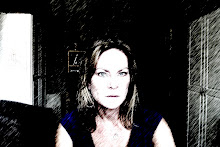Monday night I attended our North County chapter of ASA's monthly meeting. Dr. Sandy Shaw, director of AIM spoke about the executive function of the brain and how it is impaired in individuals with autism. Basically, executive functioning is the brain's ability to organize, prioritize and make decisions. In people with autism, there is so much "noise" in the brain that the connections that need to be made for this to happen, are often disrupted. I will share here Dr. Shaw's list of the symptoms that result from this executive dysfunction in the autistic brain:
Disorganization
Emotional dysregulation
Forgetfulness
Inattention
Cognitive Rigidity
Initiation or Inhibition Problems
Time Management
Sloppiness
Spaciness
(Notice that the first letters of each symptom spell "deficitss"--kind of a cool mneumonic device.)
Dr. Shaw asked us to raise our hands for each one of these if they applied to our kids. My hand never went down. This list encapsulates all of Liam's challenges academically and socially. It would make sense for me to despair that my son has every deficit on this list, but I didn't. Instead I was relieved to be reminded that my son's disability is at the core of all of his troubling behaviors. That does not mean that I for one second let him off the hook for making bad choices, but that I need to remember that he needs a LOT of help to make the right choices.
One of the hardest parts of parenting our kids with ASD is that we catch these glimpses of total lucidity, connection and competence. When that level of functioning falls for whatever reason, we feel betrayed. We feel that our child is fucking with us because we've seen them do better.
Dr. Shaw reminded me that sometimes Liam can do well, but sometimes he can't. When he can't, I've got to go back to this list and try to figure out exactly what kind of noise in his brain is interrupting his executive function. Is it the hum of a flourescent light in a grocery store? Is it his itchy skin? Is it the fact that his sister got a birthday party invitation the day before and he didn't? Is what I'm asking of him just too complex? Luckily, Liam is verbal enough to be able to help me with this process. Once we figure out what the problem is, we have to find tools to help him. Visuals, like schedules, lists and pictures, work very well for Liam, as they do for most people with autism. Dr. Shaw even mentioned some new ones I hadn't heard of: a decision tree and emotional thermometer. I can't wait to try those!
Something I kept thinking about during this presentation was a discussion I had with two of my friends a couple of months ago over cocktails. We were talking about how our kids' lives are so much more structured now than when we were kids. Every afternoon is filled with appointments, sports and other "enriching" activities. We wondered what had happened to unstructured time--time to sit around being bored. Boredom led to elaborate pretend games, social bonding with siblings and friends, and often to the library. What are we depriving our kids of when we don't leave room for down time? My friend Michelle mentioned a study she heard about--researchers compared some developmental milestones in kids of the same age thirty years ago and today. One of the important skills that was measured at a much lower level today was executive function. They attributed the loss to the lack of unstructured play.
How does autism factor into this? If you leave a kid with ASD to his own devices, he will most likely use the time to stim or play perseveratively--he's not getting the social or creative input that a typical child would. This leads me to wonder: if unstructured play time leads to the development of executive function in typical children, can we teach it to our ASD kids by prompting and engaging them in pretend play? Stanley Greenspan might have an opinion on this.
In the meantime, I will make a renewed attempt to engage Liam in pretend play and emotional bonding for at least a few minutes a day. It's a lot harder than making visual schedules and lists, but it might be more rewarding for both of us.
Wednesday, May 07, 2008
Subscribe to:
Post Comments (Atom)

No comments:
Post a Comment